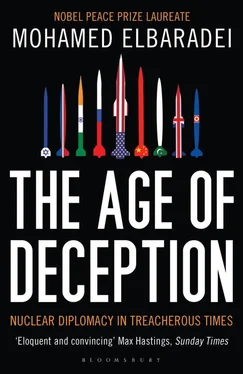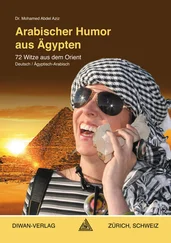Mohamed ElBaradei
THE AGE OF DECEPTION
NUCLEAR DIPLOMACY IN TREACHEROUS TIMES
To Maya, my three-year-old granddaughter,
in the hope that we will leave her a better world
“Help us help you.”
The man on the other side of the table smiled, but it was not happiness that I read in his expression. His eyes softened, and the corners of his mouth drooped. Was it sadness? Fatigue? I wasn’t sure.
It was February 9, 2003. It had been more than a dozen years since the UN Security Council had first issued sanctions on Iraq. In a little more than a month there would be yet another U.S.-led invasion. Saddam Hussein had recently readmitted UN weapons inspectors to Iraq, and Hans Blix and I, the leaders of the international teams, were making our third visit to Baghdad. This was our last evening. The Iraqi foreign minister, Naji Sabri, had invited us to dinner, along with our principal experts and an assortment of Iraqi counterparts.
The restaurant was the finest the city could still offer. Baghdad’s infrastructure was worn at the seams, showing the effects of the sanctions. But the dinner service was elegant, the waitstaff gracious, the dark red linen tablecloths spotless. There was plenty of grilled fish, fresh from the Tigris River. The skewers of lamb kebab were spiced to perfection. And the table bore another treat: wine. That was a surprise. Alcohol was forbidden in public in Iraq, under an edict passed in 1994. But for this evening, for their out-of-town guests, the Iraqis had made an exception.
The man across the table was General Amir Hamudi Hasan al-Sa’adi, chief scientific adviser to Saddam Hussein. The title of “general” was essentially honorific. An urbane, charismatic negotiator with a PhD in physical chemistry, al-Sa’adi was equally eloquent in English and Arabic and preferred tailored suits to military uniforms. Although not a member of the Ba’ath Party, he served as the scientific front man for the Iraqi government.
Blix and I had steered the dinner conversation toward a critical theme: the need for more cooperation, more documentation. You insist you have no weapons of mass destruction, we said. You tell us you have not revived any of your prior WMD programs. But we cannot simply close the file where your records are incomplete. We need more evidence. The more transparency you show, the more documentation and physical proof you can produce, the better it will be for Iraq on the world stage. What else can you provide to resolve the gaps in your information? Help us help you.
Sitting beside al-Sa’adi was Husam Amin, the head of Iraq’s UN interface group. He leaned forward to answer. “Let us be frank,” he said. “First, we cannot give you anything more because there is nothing more to give.” His glance shifted to Blix, then back to me. “But, second, you cannot help us, because this war is going to happen, and nothing you or we can do will stop it. We both know that. Whatever we do, it is a done deal.”
He sat back. Al-Sa’adi nodded but said nothing. The sadness remained in his smile.
Despite Amin’s view, I refused to believe that war was inevitable. The International Atomic Energy Agency, the UN agency responsible for the nuclear weapon inspections, which I headed, had been making solid progress. This included following up on every intelligence lead we were given—and finding nothing. In my report to the UN Security Council on January 27, I had stated, “We have to date found no evidence that Iraq has revived its nuclear weapons programme.” This statement had garnered strong criticism from Western officials and media pundits who had convinced themselves otherwise—but these critics were pointing to circumstantial what-ifs and characterizing them as proof. What I had said was the truth.
The IAEA was not yet in a position to issue Iraq a clean bill of health. But I had urged the council to allow the inspections to run their course. A few more months, I had proposed, would constitute “a valuable investment in peace.” If the justification for a preemptive invasion of Iraq rested on Saddam Hussein’s reconstituted WMD programs, then where was the evidence? Where was the imminent threat? If Amin was telling the truth, and Iraq had “nothing more to give,” then the implications were significant: there was no threat.
A war without justification was certain to drive a divisive wedge into the already fractured relationship between the nuclear “haves” and “have-nots.” Both the United States and the United Kingdom had nuclear weapons and showed no signs of giving them up; yet they were threatening Iraq for allegedly seeking to acquire such weapons. For many in the developing world, and particularly in Arab and Muslim societies, this was both ironic and grossly unfair. Saddam Hussein enjoyed relative popularity among the Arab public for his stance against Israel’s treatment of the Palestinians and his defiant attitude toward the West. He was not a favorite among the mostly pro-Western Arab rulers, particularly after his 1990 invasion of Kuwait; but still it rankled to watch Iraq being treated with such disregard for its sovereignty. If a war were actually to occur, and particularly one hinging on trumped-up WMD charges, the sense of outrage across the Arab and Muslim world would escalate sharply.
Still, as the weeks wore on, with all my faith in the inspection process, I had a growing sense of unease. The rhetoric emanating from the United States and the United Kingdom was increasingly strident. Just four days before the dinner in Baghdad, U.S. secretary of state Colin Powell had made his case to the Security Council: he had played audio tapes of intercepted telephone conversations and had shown satellite photos of Iraqi facilities. These records, he declared, demonstrated “disturbing patterns of behavior” on the part of Saddam Hussein and his regime, “a policy of evasion and deception.” To the inspection community, his presentation was primarily an accumulation of conjecture, an alignment of unverified data interpreted according to a worst-case scenario. Nowhere was there a smoking gun. But to many listeners, and particularly to nonspecialists, Powell’s argument was compelling.
During the six weeks that followed, no amount of inspection progress or diplomatic intervention would prove sufficient to avert the impending crisis. The IAEA revealed that key intelligence documents, purportedly linking Saddam Hussein to attempts to purchase uranium from Niger, had been forged. But the discovery made little impact. An emergency summit of Arab leaders in Sharm el-Sheikh, instead of developing a solution or even a unified position, ended in disarray. A last-ditch proposal by the British to avoid military action fell flat.
Early on the morning of March 17, I received the call from the U.S. mission in Vienna advising us to move our inspectors out of Baghdad. The invasion was about to begin.
“If a danger exists in the world, it is a danger shared by all; and equally… if hope exists in the mind of one nation, that hope should be shared by all.” These were the words of U.S. president Dwight D. Eisenhower in 1953, in the “Atoms for Peace” speech that, four years later, gave birth to the International Atomic Energy Agency. It was an extraordinary message, delivered in the midst of an expanding nuclear arms race, to an international community that had not forgotten the devastation of the Second World War.
Eisenhower’s Atoms for Peace concept—the notion that both the benefits and insecurities of nuclear science must be addressed cooperatively by the international community—is the core principle of nuclear diplomacy. It would become a near-universal commitment to foster technological cooperation in peaceful uses of atomic energy and to prevent the spread of nuclear weapons—a dual commitment enshrined in the IAEA Statute and the landmark 1970 Treaty on the Non-Proliferation of Nuclear Weapons (NPT).
Читать дальше












